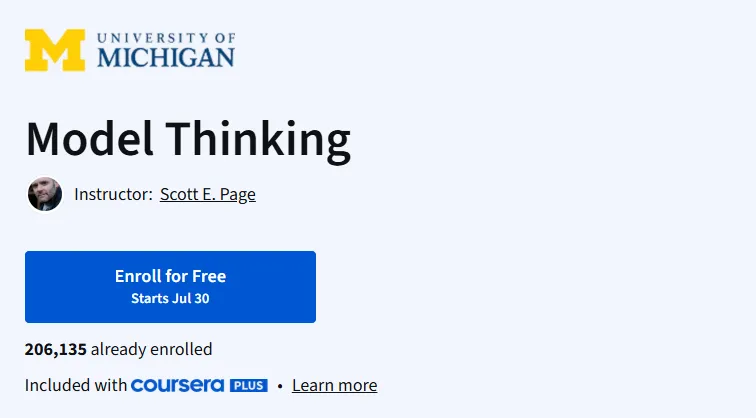What will you learn in Model Thinking Course
Understand the importance of models in interpreting and shaping the world.
Apply various types of models—decision, growth, social network, and contagion models—to real-world scenarios.
Think systematically using models to improve predictions and decisions.
Recognize the strengths and limitations of different models in complex environments.
Program Overview
Module 1: Why Model?
⏱️ 1 week
Topics: Purpose of modeling, cognitive limitations, value of multiple models.
Hands-on: Introduction to conceptual modeling through basic real-world examples.
Module 2: Types of Models
⏱️ 2 weeks
Topics: Decision models, tipping points, linear vs. nonlinear thinking.
Hands-on: Analyze examples like Schelling’s segregation model and simple voting models.
Module 3: Predictive & Social Models
⏱️ 2 weeks
Topics: Forecasting, diffusion models, feedback loops, network theory.
Hands-on: Simulate social networks and diffusion of innovation.
Module 4: Growth and Aggregation
⏱️ 2 weeks
Topics: Exponential vs. logistic growth, random walks, aggregation mechanisms.
Hands-on: Interpret population dynamics and economic trends using models.
Module 5: Complex Systems & Model Ensembles
⏱️ 2 weeks
Topics: Diversity of models, combining models, wisdom of crowds.
Hands-on: Evaluate complex systems like cities, markets, and ecosystems using layered modeling.
Get certificate
Job Outlook
High value across data science, public policy, economics, finance, and social sciences.
Enhances critical thinking for analysts, policymakers, researchers, and decision-makers.
Salary potential: Analysts or modelers can earn $60,000–$120,000 depending on industry and experience.
Strong foundation for roles involving forecasting, systems analysis, and simulations.
Specification: Model Thinking
|
FAQs
- No prior programming or advanced math required.
- Focuses on conceptual understanding of models.
- Suitable for analysts, researchers, and curious thinkers.
- Emphasizes systematic thinking and decision-making.
- Includes practical examples and simulations without heavy computation.
- Learn decision-making and forecasting models.
- Explore social network and diffusion models.
- Study growth, aggregation, and complex system models.
- Hands-on exercises simulate real-world scenarios.
- Understand the strengths and limitations of each model type.
- Covers diffusion of innovation and feedback loops.
- Introduces network theory for modeling social systems.
- Hands-on practice with social network simulations.
- Explains forecasting methods and their limitations.
- Prepares learners for applications in policy, economics, and research.
- Strengthens problem-solving using structured models.
- Applies models to complex systems like markets or cities.
- Useful in data science, economics, public policy, and social sciences.
- Builds skills in interpreting and combining multiple models.
- Certificate validates mastery of model-based reasoning concepts.
- 5 modules: Why Model?, Types of Models, Predictive & Social Models, Growth & Aggregation, Complex Systems & Model Ensembles.
- Each module: ~1–2 weeks at a moderate pace.
- Self-paced with lifetime access.
- Hands-on conceptual exercises included in every module.
- Total duration: ~9 weeks.





